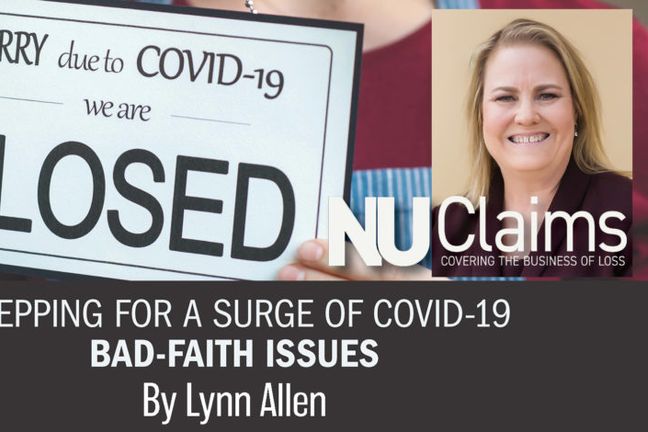The Arizona appellate courts recently issued two important decisions involving insurance coverage and bad faith. These decisions will impact the Arizona insurance industry and are discussed below.
Appeals Court Must Evaluate Whether Refusal to Consent to Settlement was Reasonable from Insurer’s Perspective
The Arizona Supreme Court recently held that the objective reasonableness of an insurer’s decision to withhold consent to a settlement is determined from the perspective of the insurer, not insured.[i] The insured in the case, a publicly traded higher-education service provider, had coverage under a directors and officers (“D&O”) policy and asserted breach of contract and bad faith claims against its insurer. The policy provided $15,000,000 in D&O coverage but did not include a duty to defend. The policy contained a clause requiring the insurer’s consent to settlement, which provided the insurer would not unreasonably withhold consent.
The underlying case which resulted in a settlement was filed in 2006. A Teamsters pension fund filed a class action lawsuit against the insured alleging improprieties in the issuance of stock options to executives. The District Court dismissed the action under Rule 9(b) for failure to allege falsity with particularity. The pension fund appealed the decision to the Ninth Circuit Court of Appeals. While the appeal was pending, the pension fund and insured participated in mediation and reached a settlement. The insurer refused to consent to the settlement. The insured then funded the settlement and sued the insurer in the District Court alleging breach of contract and bad faith. The District Court granted summary judgment in favor of the insurer. The insured filed an appeal arguing the insured, not the insurer, should evaluate the reasonableness of the decision.
The United States Court of Appeals for the Ninth Circuit certified a question to the Supreme Court of Arizona asking the Court to determine the standard for determining whether the insurer unreasonably withheld consent to the insured’s settlement with shareholders where the insurer had no duty to defend. The Supreme Court found the policy to be unambiguous and held under a policy without a contractual duty to defend, the objective reasonableness of the insurer’s decision to withhold consent is assessed from the perspective of the insurer, not the insured. The insurer must independently assess and value the claim, giving fair consideration to the settlement offer, but need not approve a settlement simply because the insured believes it is reasonable. This decision is a clear victory for the insurance industry and signals the Court’s willingness to enforce clear and unambiguous policy language in favor of insurers.
Arizona Court of Appeals Holds Morris Agreements Apply to Title Insurance Policies
The Court of Appeals of Arizona recently held that in the context of title insurance, an insured defended under reservation of rights may settle with a third-party claimant without violating its duty to cooperate with insurer’s defense, and an exclusionary provision in title insurance policies denying coverage for liens “created” by insured applies to mechanics’ liens..[ii] The case involved holders of mechanics’ liens who had filed foreclosure actions alleging their liens had priority over the security interests insured under the title insurance policy. The insurer provided the insureds with a defense under a reservation of rights. The mechanics’ lien holders and the insureds settled the claims under a Morris agreement, pursuant to which the mechanics’ lien holders were paid certain proceeds from a bankruptcy sale of the property and the insureds assigned their breach of contract and bad faith claims against the insurer to the mechanics’ lien holders. The insurer intervened to challenge the validity of the settlement agreement and filed a separate complaint contesting coverage. The mechanics’ lien holders counterclaimed on their assigned claims for breach of contract and bad faith.
The Court of Appeals’ decision is a mixed bag but was ultimately favorable to the insurer. Consistent with existing Arizona law, the Court held the principles of Morris v. USAA apply to title insurance. Although title insurance is first party insurance and Morris involved third party liability insurance, title insurance contains the same hallmarks of a liability policy in terms of duty to defend and right to settlement. Further, the Court held a Morris agreement’s form need not include all elements of the settlement in Morris, which involved a stipulated judgment with a covenant not to execute accompanied by an assignment of insurance claims. The Court found the parties’ settlement agreement fell within Morris’s parameters.
The Court then considered whether the insurance policy covered the claims. First, exclusion 2(b) provides coverage applies only so long as the insured retains an interest in the land. The insurer argued the conveyance of the property in the bankruptcy court proceedings terminated coverage for the claims. The Court of Appeals disagreed, finding the claim arose before the sale and was therefore covered. Second, exclusion 3(a) excluded coverage where the insured was responsible for creating the lien. Here, the original insured failed to fund the construction project, giving rise to the mechanics’ liens. The Court held the insurer had the right to assert all defenses it had against the insured against the successors to the insured’s claims. Therefore, because the insured’s actions gave rise to the mechanics’ liens, there was no coverage under the title insurance policy. The Court reversed the trial court’s contrary coverage decision and affirmed the trial court’s summary judgment in favor of the insurer.
Takeaway
These decisions signal the manner in which Arizona courts will enforce unambiguous policy provisions. Policy provisions, especially those which detract from coverage, will most likely be construed in favor of the insured.
[i]Apollo Educ. Grp., Inc. v. Nat’l Union Fire Ins. Co. of Pittsburgh, PA, 480 P.3d 1225 (Ariz. 2021)
[ii] Fid. Nat’l Title Ins. Co. v. Osborn III Partners LLC, No. 1 CA-CV 18-0040, 2021 WL 868913 (Ariz. Ct. App. Mar. 9, 2021)

 Author: Lynn Allen
Author: Lynn Allen
 Cannabis Workers Allege Quota to Trim 4 Pounds a Day Violates the California Labor Code
Cannabis Workers Allege Quota to Trim 4 Pounds a Day Violates the California Labor Code
 The Ninth Circuit Reminds Us: Every Word Matters
The Ninth Circuit Reminds Us: Every Word Matters
 NO WAY, PRO SE! The Consequences of Abusing the Judicial System as a Pro Se Litigant in Colorado
NO WAY, PRO SE! The Consequences of Abusing the Judicial System as a Pro Se Litigant in Colorado
 Victim of Financial Mismanagement or Unlawful Retaliation? New Jersey City University Program Founder Claims School Retaliated After Reporting Alleged Sexual Harassment
Victim of Financial Mismanagement or Unlawful Retaliation? New Jersey City University Program Founder Claims School Retaliated After Reporting Alleged Sexual Harassment
 “Real Housewives” Gets a Reality Check
“Real Housewives” Gets a Reality Check
 Missing a Chapter: Insufficiency of Expert Deposition Testimony in Medical Malpractice Litigation
Missing a Chapter: Insufficiency of Expert Deposition Testimony in Medical Malpractice Litigation
 Crash Course: Why Summary Judgment Misses the Mark in Illinois Multi-Cause Limousine Crash Collision
Crash Course: Why Summary Judgment Misses the Mark in Illinois Multi-Cause Limousine Crash Collision
 Bitter Truths: Lead, Cadmium, and Defective Pleadings in California Chocolate Class Action
Bitter Truths: Lead, Cadmium, and Defective Pleadings in California Chocolate Class Action
 The Law of Unintended Consequences: Including Insurance Brokers in Litigation Strategy Communication May Waive the Attorney-Client Privilege
The Law of Unintended Consequences: Including Insurance Brokers in Litigation Strategy Communication May Waive the Attorney-Client Privilege
 Prepping for a Surge of COVID-19 Bad-Faith Issues
Prepping for a Surge of COVID-19 Bad-Faith Issues
 Bad Faith in the Age of COVID-19
Bad Faith in the Age of COVID-19
 Tyson & Mendes Appellate Win In Arizona
Tyson & Mendes Appellate Win In Arizona